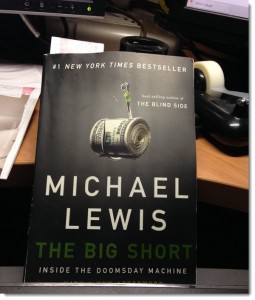Can Hollywood Explain a CDO?
Loved the movie with Steve Carrell, Christian Bale, Ryan Gosling and Brad Pitt and I’m halfway through the book by Michael Lewis. If I had to summarize both it would be they recount how some “masters of the universe” on Wall Street through ignorance, greed, hubris and laziness, almost blew up the world financial systems. Before I wrote anything about it I went looking for a critic of the book and found one. However, his criticism was that the characters portrayed sympathetically in both the book and the movie were just as greedy and amoral as everybody else.
I’m interested in this because I have had careers in both the financial services industry and residential real estate here in Durham. However, it was not just a small core of Wall Street villains that perpetrated the near disaster, it also involved a lot of Main Street operatives that rode the bubble as well.
At the heart of everything were the subprime mortgages that were made to people that were often not even asked to demonstrate any ability to make the payments. There were lots of instruments like the “no doc” or “low doc” loan that I still have on my home. This seemed like a great thing, especially for independent contractors such as Realtors, whose income is less predictable than someone with an annual salary.
It was an interesting movie and no matter what you think about government regulation, it would be hard to come away from it without thinking that some controls on the financial services industry are necessary. You must also conclude that the bailout was necessary. “To big to fail” means that the institutions that put themselves at risk are too vital to commerce to let them pay for their own sins. In other words, the taxpayer bailout was necessary because the consequences of not doing it were much worse than doing it.
There are lingering consequences to you if you want to buy or sell a house. It also has implications for Realtors, some of whom are convinced that sooner or later things will get back to “normal.” I am convinced that things will never get back to the pre-recession levels when I got my license back in the early 2000’s. There are a few reasons why.
Realtors may tell you that inventories are low, but there is enough inventory. The difference is that buyers don’t have as many choices. During the recession lots of people lost their homes but even more people lost tremendous amounts of equity making it less attractive to move up to larger or more suitable homes. Does this make it a sellers’ market? Yes, and No. Yes, because there are buyers for a home that is attractive and well priced. No, because there are fewer buyers ready to “move up” after losing so much equity. There are also fewer buyers that can meet more stringent credit guidelines and down payment requirements.
Appraisers were affected too. Usually, everybody wins…seller, buyer, mortgage provider and appraiser when a home “appraises” during the transaction process. But no one should assume that appreciation will continue to mask a multitude of sins in that process. This is restraining price increases and making appraisers more cautious. This is good for buyers but bad for potential sellers who need more equity in their homes to sell them and move up.
There are also fewer buyers that assume that they can buy a home with the intention of only staying in it a couple of years and sell it for enough to pay off their mortgage and sales expenses like an agent’s commission. Around here it was common for hospital residents, for example, who were only going to be here two or three years, to purchase a home for their stay. This doesn’t make much sense anymore.
How Does this Affect Real Estate in Durham?
If you do want to sell your home, this means that the home has to be attractive and in good shape, priced right and promoted right. As you might imagine, a lot of agents don’t want to admit that things are different. If you ask many about their marketing program they will tell you how they get clients or how they market themselves, not how they market a home.
These product marketing skills where not something you needed in abundance during the bubble years. This is the 4 P’s way of marketing and the subject of Fun to Sell, Easy to Buy.
